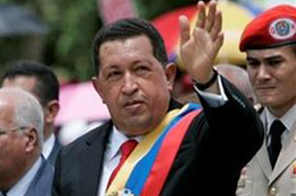Venezuela, US restore ambassadors
MARACAY: Venezuela and the United States said Wednesday they will restore their ambassadors more than nine months after President Hugo Chavez expelled the U.S. envoy in his final diplomatic bout with the Bush administration.
But Chavez signaled he still has major differences with Washington, accusing the U.S. of having a hand in recent protests in Iran and saying he hopes President Barack Obama will lead the United States on a new path.
"I hope that Obama takes charge of dismantling the empire," Chavez told reporters. He added that he hopes the "United States starts to respect the world."
U.S. State Department spokesman Ian Kelly said in Washington that the time frame for restoring the ambassadors remained unclear, but a top Venezuelan official said the exchange would happen soon.
Chavez a fierce opponent of U.S. policy who once likened President George W. Bush to the devil has expressed hope for improved relations with Washington following years of tensions with the Bush administration. Obama says his government wants to improve ties with all nations in the Americas.
Chavez's foreign minister, Nicolas Maduro, said the governments have agreed to overturn the "persona non grata" status given each other's ambassadors in September, when Chavez expelled U.S. Ambassador Patrick Duddy and recalled his envoy to Washington.
Chavez said at the time that he kicked out the ambassador to show solidarity with Bolivia after Bolivian President Evo Morales ordered out the top U.S. diplomat in his country, accusing him of helping the opposition incite violence. Washington denied the allegation and reacted by expelling the envoys of both Venezuela and Bolivia.
Maduro said that he had spoken with Thomas Shannon, the top U.S. diplomat for the Americas, and that they "effectively reached an agreement on the proposal" to restore ambassadors as part of an effort to improve relations.
"The two ambassadors will re-establish their positions immediately — our ambassador, Bernardo Alvarez, in Washington and the U.S. ambassador, Patrick Duddy, in Caracas," Maduro said.
Kelly told reporters in Washington that the two nations are "currently taking the necessary measures" to exchange ambassadors, but said it was unclear when it would happen or who the U.S. envoy would be.
After hostile relations with the Bush administration, Chavez has warmed to the Obama administration. He greeted the new U.S. president with handshakes at an April summit in Trinidad and Tobago, where he discussed restoring ambassadors with U.S. Secretary of State Hillary Rodham Clinton.
But as he hosted a summit of like-minded leftist leaders Wednesday, Chavez criticized U.S. policies toward Bolivia and called for an end to the U.S. trade embargo against Cuba.
He also strongly criticized the United States for canceling more than $60 million in assistance to Nicaragua over concerns about democracy, saying "that's imperialism."
Chavez said he suspects U.S. and European intelligence services have been involved in stirring up post-election protests in Iran. He didn't offer evidence but said the unrest follows a pattern seen in various countries, where "behind it is the CIA and the imperial hand of European countries and the United States."






